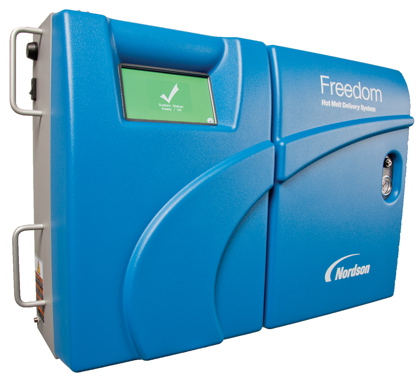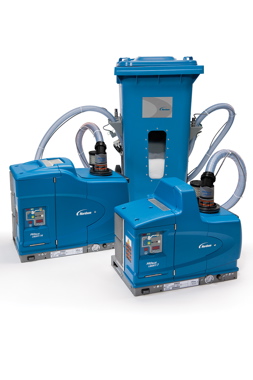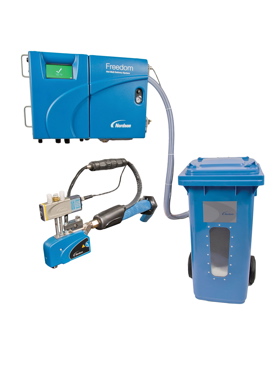
The everlasting bonds – June 2015, Canadian Packaging
By George Guidoni, Editor
Automation Food Safety Corrugated Paperboard Packaging 3M Canada Company adhesive technology report Nordson Canada OBX Works Inc. Research and Markets Shurtape Technologies slideshow Valco MeltonAdhesive technologies keep evolving with the times to remain an indispensable technology asset for progressive packaging end-users worldwide.
Developed by industrial tapes market leader 3M Company as an environmentally-friendly alternative to plastic bags, the highly innovative 3M Carry Handles offer retailers a convenient stick-on solution for enabling consumers to take home large-sized or awkward items that uses 97 per cent less plastic than traditional shopping bags.
Whatever packaging adhesives and tapes may lack at first glance in terms of mass sex appeal or aesthetic pizzazz is more than offset in terms of their integral indispensability as a core technology for maintaining structural packaging integrity and functionality.
In fact, it is virtually unfathomable to picture a modern-day packaging line—however automated or not—not housing at least one gluing or tape-sealing station employed somewhere along the line to keep the finished primary packages or secondary packaging containers performing as intended to provide optimal protection for the product inside.
In the same vein, there is nothing like a malfunctioning adhesive or tape applicator to make even the most advanced packaging lines out there to come to a grinding and increasingly expensive halt due to poor bonding performance or unsightly quality blemishes and defects.
And as the world continues to produce more packages to accommodate rapid population growth and the emergence of a middle class in BRIC (Brazil, Russia, India and China) countries and beyond, the demand for both packaging adhesives and tapes will continue to ensure steady revenue sources for manufacturers of dispensing and applicating systems and equipment for the foreseeable future.
According to a recent report from the Dublin, Ireland-based Research and Markets, the estimated US$4.9-billion market for packaging adhesives is expected to grow at a compound annual growth rate of 6.6 per cent through 2019, with robust growth expected to continue in key packaging applications such as case and carton, corrugated packaging, labeling, bags, folding cartons, and specialty packaging segments.
NO SLOWING DOWN
While the stubborn economic slowdown in the mature North American and European markets has had some negative impact, leading global producers such as Henkel, H.B. Fuller, Bostik and Paramelt have used the slowdown as an opportunity to launch innovative new products and expand their geographic reach into the high-growth parts of the world.
“These companies are consistently focusing on expanding their production capacity to achieve a competitive advantage and thereby serving the customers more effectively,” the report points out.
“Expansion and new product launches were the most preferred strategies by the top players in 2013 that were driving the demand of packaging adhesives, while their strategy to capture the untapped market in developing economies includes acquisitions and joint ventures.”

3M Company’s box-sealing systems like this fully-automatic 3M-Matic Case Sealer 7000a Pro are a common sight on secondary packaging lines all over the world.
It’s a similarly upbeat scenario unfolding the global market for industrial tapes—aka pressure-sensitive adhesives (PSA)—where globally-operating market segment leaders such as 3M Company (PSA for tapes) and Avery–Dennison (PSA for labels) are consolidating their leadership positions in a market expected to be worth an estimated $8.4 billion by 2018, according to a study from RnR Market Research.
“Every company, big or small, wants to penetrate deeper into the existing market and at the same time expand into new and emerging markets to increase their sales margin—thereby increasing their overall revenue,” the report states.
As in many other segments of the packaging industry, packaging sustainability and related environmental issues have had a major impact in the way tapes and adhesives suppliers approach their product development and innovation, including the aforementioned 3M Company’s Industrial Adhesives and Tapes Division business.
“While recycled corrugate boxes are becoming increasingly popular as an eco-friendly and cost-effective packaging option, unfortunately each time boxes are recycled their fibers become shorter and weaker,” says Nuno da Silva, business manager of the Industrial Business Division of 3M Canada Company in London, Ont.
“The shorter the fiber, the more resistant it becomes to both adhesive and moisture.
“This is particularly risky in the food-and-beverage industry, where recycled corrugate is used in refrigerated environments,” da Silva expands. “In addition, used boxes often contain contaminants like plastics, glues, inks and waxes, which can be even more resistant to the adhesive.
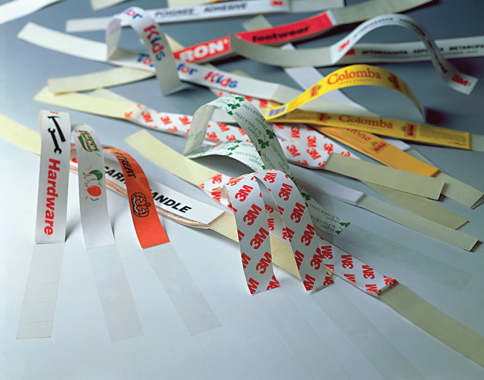
In addition to providing a solid grip to enable easy carrying of all sorts of large or awkward-shaped consumer packages, the pre-printed 3M Carry Handle also provide retailers and brand-owners alike with plenty of branding opportunities.
To address the issue, 3M proceeded to engineer a brand new box taping solution with spectacular sealing capabilities for this particular application.
Marketed under the company’s iconic flagship Scotch brand label, the patented Recycled Corrugate Box Sealing Tape 3071 provides 10 time the holding strength of the conventional box-sealing tapes by actually penetrating right through the top couple of box surface layers to achieve the required sealing strength and integrity.
BREAKING FREE
“For our customers, it’s important to create a seal that won’t break down—no matter how many times their cardboard has,” says da Silva.
“This tape is our innovative solution to help our customer protect their products and their profits without sacrificing their sustainability goals.”
Says da Silva: “No matter the materials, our customers all have one thing in common: they invest an incredible amount of effort and care into their products, and it is our job to help maintain their integrity.
“Even though the materials may vary dramatically, it’s crucial that our packaging solutions take care of the details to give our customers a consistent, reliable package every time,” says da Silva, citing 3M’s expertise in the manufacture of both tapes and the tape applicating and dispensing systems—covering the full range for handheld manual tape guns to the fully-automatic, high-precision, integrated system solutions such as the new 3M-Matic Case Sealer 7000a Pro system.
Nordson Corporation’s recently commercialized tankless hot-melt melting and dispensing technologies include the highly flexible Freedom system range (directly above) and the technologically-advanced ProBlue Liberty Fulfill Multi-Bin system (left picture), which combines the company’s flagship ProBlue melter with sophisticated auto-fill technology.
Equipped with three patented high-performance patented 3M AccuGlide taping heads, the systems uses the heads to apply three rounds of pressure to give each box a strong,thorough seal similar to what a manual laborer would do, but at a fraction of the time and in just the right amount of tape.
“All our packaging tapes and equipment are engineered to manage the small details so that our customers can realize the big picture,” da Silva explains. “We know the details matter to our customers.
“If the seal on just one box pops open in transit, it can result in a loss of profit, reputation, brand value … you name it,” he says. “And if multiple seals pop open, the losses multiply exponentially, with devastating impact on productivity and resources.”
Says Da Silva: “The scope of packaging material technologies is continuing to expand.
“On one end of the spectrum, many companies are trying to lower their costs by using inexpensive materials like LSE (Low Surface Energy (LSE) plastics.
“While economical, these materials are very difficult to stick to,” Da Silva points out. “On the other end of the spectrum, companies are trailblazing with high-tech composites.
“We’ve seen these materials do amazing things, but they can also be difficult to adhere to.”
David Petteplace, regional manager for Canada with the Markham, Ont.-based Nordson Canada, Limited, a division of the Duluth, Ga.-headquartered dispensing systems manufacturer Nordson Corporation, says the applicating systems segment has an important role to play in the packaging sustainability equation.
“Our customers are interested in sustainability through saving adhesives and energy, “Petteplace states, “and our tankless melter technology developments allow melters to be far more energy-efficient, in addition to minimizing adhesive waste and downtime caused by charring and debris.
“Moreover, new pattern controls can now dispense the packaging adhesives in extremely precise manner, utilizing exact stitching patterns to help reduce adhesive waste even further,” he adds.
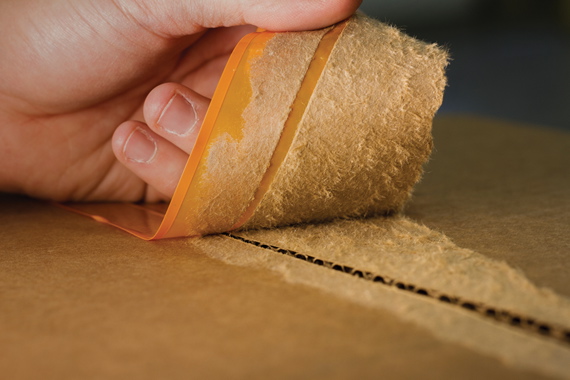
Providing 10 times the bonding strength of traditional box sealing tapes, 3M’s Scotch Recycled Corrugate Box Sealing Tape 3071 was developed specifically to ensure secure sealing of recycled corrugated cases by actually penetrating beneath the box surface.
Having been a leading player in the hot-melt dispensing equipment industry for over 50 years, Nordson enjoys well-earned worldwide brand recognition for its universally renowned, signature-blue ProBlue range of adhesive applicators.
But never the type to rest on past laurels, Nordson’s fairly recent commercialization of new-generation tankless melting technology positions it extremely well for meeting the future needs of 21st Century manufacturing, according to Petteplace.
NEW THINKING
“Tankless melters are giving manufacturers new options to rethink their adhesive usage and reduce related costs by integrating and optimizing major system components such as adhesive melting, auto-fill technology, system monitoring and diagnostics,” Petteplace explains.
“Essentially, a tankless fill system allows customers to melt what they need and when they need it—limiting adhesive waste,” says Petteplace, citing the company’s well-received launches of the tankless Freedom and Liberty system platforms over the past 24 months, along with the introduction of Spectra pattern controllers, as a potentially key turning point for the adhesive industry at large.
“There is no doubt that they have created significant advancements in adhesive processing, safety, precision dispensing and sustainability,” Petteplace asserts.
“An intuitive, integrated control system gives users complete control of the adhesive dispensing process, from pre-stored patterns to troubleshooting alerts, and easy-to-understand, plain-language tips that walk operators through steps to resolving any issues,” he adds.
“And as time goes on in the packaging industry,” Petteplace reasons, “adhesive melters will get smarter and require even less operator attention, just as these more efficient melt systems will reduce the need for large adhesive tanks and the requirement to keep large volumes of adhesive at application temperature.”
Andy Stamp, national sales and product manager for the Cincinnati, Ohio-headquartered hot-melt dispensing and quality control equipment manufacturer Valco Melton, concurs.
“Sustainability efforts continue to be a key ingredient in package design as well as in the packaging equipment design,” says Stamp. “And as the packaging industry continues to feel the pressure to reduce its overall carbon footprint, all-electric gluing systems offer an attractive solution toward fulfilling those goals,” he predicts.
“The possibilities this type of all-electric technology can bring to package design are almost endless, especially for the food and beverage manufacturers who are in a constant state of change.
“Because the industry has moved from mass production to mass customization,” Stamp reasons, “it is no longer enough for packaged goods companies to get large quantities of product to market faster.
“To be successful, they must also stay ahead of the curve and deliver the customized packaging increasingly being demanded by today’s consumers.
“For companies like Valco Melton, this demand is one of the main driving forces behind the development of new, low-impact adhesive solutions where innovative technology and versatility take center stage,” says Stamp, hailing the company’s all-electric CHOICE system range of hot-melt dispensing systems as the future of adhesive dispensing.
HOT NEW TRENDS
“Customization, along with other industry trends toward employing more sustainable practices throughout the entirety of production processes, requires adhesive dispensing technologies to be hands-free, maintenance-free, and to consume less energy,” Stamps remarks.
“To meet these needs, our company has really been spearheading the development of all-electric technologies to replace the more traditional pneumatic systems,” Stamp asserts.
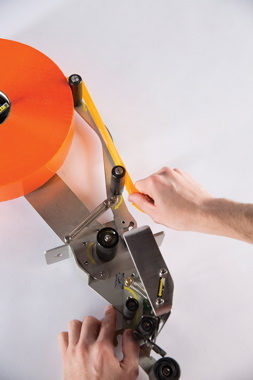
Manufactured by Shurtape Technologies, the QuickChange Sealing System (left) is the company’s latest advancement of its patented ShurSEAL Solution technology for producing reliable, tamper-evident seals at optimal line speeds.
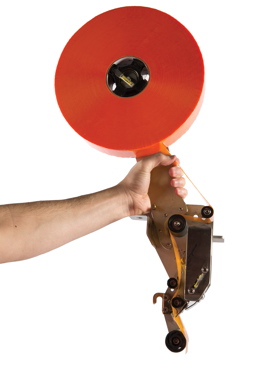
“As a result, we’ve made great strides improving uptime, reducing maintenance and part changes—by way of eliminating compressed air and the number of moving parts—as well as in greatly decreasing adhesive usage for overall improved OEE and reduced carbon footprint,” Stamp relates, adding that he expects hot-melt technologies to keep gaining market share from the PSA tapes in the years ahead.
“The use of tape on primary packaging is already no longer acceptable to some customers,” he suggests, “and as the focus has shifted toward sustainability in the packaged goods industry, most Big Box stores and retailers are now pushing manufacturers to eliminate secondary packaging, as well as to create shelf-ready display cases with primary packaged goods ready for sale.
“Accordingly, tape will continue to decline in market share as retailers increasing demand only for primary packaging to be shipped for the products they sell and bring into their stores,” Stamp asserts.
“I also expect to see increased demand for higher-quality adhesives,” he adds. “While they are more expensive than some other lower-quality adhesive products, using a higher-quality adhesive means you don’t have to use as much of it.”
Understandably, leading tape application system manufacturers like Shurtape Technologies, LLC are far less inclined to fully subscribe to that view.
According to the company’s market manager for packaging Bill DeWitt, dismissing the importance of PSA tapes for future packaging applications is result of a distorted view of tapes as a commodity product.
Says DeWitt: “Tape is too often viewed as a commodity product that should be purchased for the lowest price possible.
“However, the quality of tape and how it’s applied to cartons are critical considerations for maintain the integrity of the carton and products, as well as for keeping packaging lines up-and-running,” DeWitt says.
According to DeWitt, most of the negative experiences encountered with tapes and tape applicating equipment can be traced to improper selection of materials and sealing systems for the application at hand.
“The issue of seal integrity is an important consideration because unsecured carton seals can result in product damage, theft, contamination, and other costly consequences,” he acknowledges. “But more often than not, this issue can be caused by improper adhesion of the tape to the box, insufficient wipe-down force achieved by the tape applicator, or using the wrong tape for the carton or environment.
“Addressing these issues from the outset will result in more secure, tamper-evident carton seals to keep the cartons intact throughout the distribution network,” he says, “while ensuring that the packaging lines are running at peak operational efficiency.”

The all-electric CHOICE hot-melt applicating systems. manufactured by Valco Melton is designed as a much more energy-efficient alternative to pneumatic-based systems.
As DeWitt explains, “It is always important to select a quality tape that meets your sealing requirements to ensure your cartons and goods arrive at their final destination intact.
“For example, if you’re sealing high-value electronics, you may want to select a higher grade of tape; if you’re sealing in a cold-temperature environment, look for a specially formulated tape that can withstand colder temps; and if you’re using recycled cartons, pick a tape designed to stick to recycled content.”
Insofar as production line downtime, DeWitt cites inconsistent film thickness, thin adhesive coating, and too little release coating as the most frequent causes of failure.
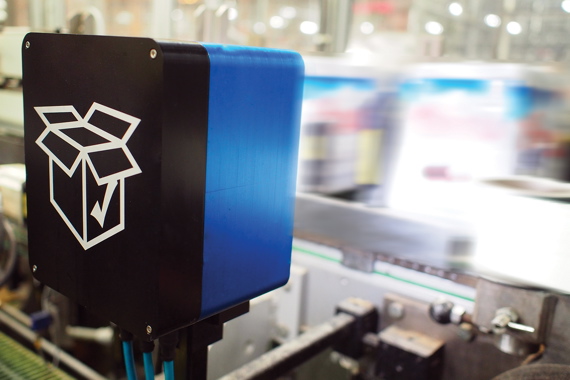
Valco Melton’s PackCheck hot-melt inspection system in a high-accuracy inline quality control system that quickly detect and rejects poorly-sealed packages right off the line.
To avert these problems, tape end-users should always do their homework in regards to their tape’s critical attributes such as thickness, shear power, tensile strength, tack and elongations properties, and adhesion performance.
“There are many tape options available with different adhesive systems and grades,” DeWitt points out. “Acrylic and hot-melt are the two common adhesive tapes, each providing their own benefits.
“Acrylic tapes offer good initial tack, but the adhesive may flow out when external stress forces are met,” he relates, “whereas hot-melt tapes offer an aggressive bond and higher cohesive strength to stand up against the challenges of the distribution network.
“Many tape manufacturers like Shurtape place their tapes through rigorous testing to ensure they provide strong holding power, which is typically done through a shear test that which simulates the tape being adhered to the side of a carton,” DeWitt relates.
“In most industrial packaging applications, it is best to use a tape that is rated at or above 10,000 minutes of holding power,” he advises.
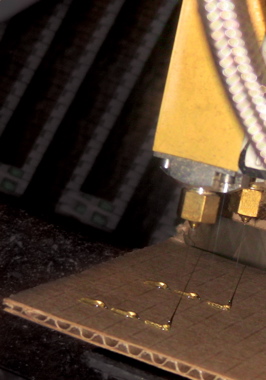
A Valco Melton hot-melt dispensing nozzle applying the EcoStich gluing pattern in a carton-sealing application.
Alex Wong, head of sales and engineering at the Toronto-based adhesive dispensing systems integrator, OBX Works Inc., says that regardless of the choice of hot-melt adhesives or tapes to do the job, the key issue in today’s manufacturing is the need to make the process as automated as possible just on the account of related occupational safety issues alone, among other key considerations.
“Everyone knows the cost of a workplace injury,” Wong states.
“A properly designed hot-melt system with zero weight guns, supported by tool balancers and light trigger effort, provides an ergonomic solution that will eliminate sore hands and fingers, carpal tunnel syndrome, etc.,” he reasons.
“Adding safety to your process is always a bonus that our customers like to use in their proposals to management,” says Wong, while extolling the safety attributes and performance capabilities of the InvisiPac brand of hot-melt dispensers manufactured by the Minneapolis, Minn.-based Graco Inc. and distributed in Canada exclusively by OBX Works.
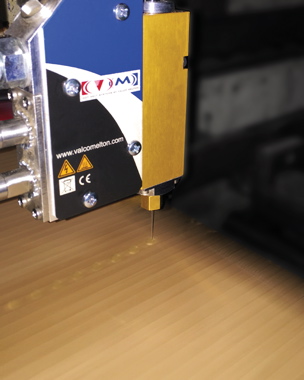
The EcoStich adhesive applicating pattern can also provide secure sealing by dispensing just tiny dots of glue.
QUALITY FIRST
“We only use high-quality parts and consumables, and we only work with suppliers that provide quality equipment and customer service,” Wong states. “Our customers expect the same from us and I need to be sure that a process will provide consistent performance.”
Says Wong: “Poor quality adhesives are unstable and can cause problems even after the product has left the plant: We have all seen pop-opens at the grocery store, where I’m often tempted to buy the package just to get it off the shelf!
“Nobody likes to spend a large sum of money,” Wong allows, “but some of our InvisiPac installations have an ROI (return-on-investment) of less than a month, albeit three to six months is more common.
“After that it’s all savings,” he enthuses. “The beauty of the InvisiPac technology is that it reduces hot-melt usage by 20 to 50 per cent, while effectively eliminates nozzle clogs.
“And even though Graco in already enjoying great success with this product, they aren’t finished,” he adds.
“They’ve already released an integrated pattern controller, a new family of guns and a network-ready monitoring package only two years after the initial launch,” Wong colludes, “and I just can’t wait to see what’s next!”
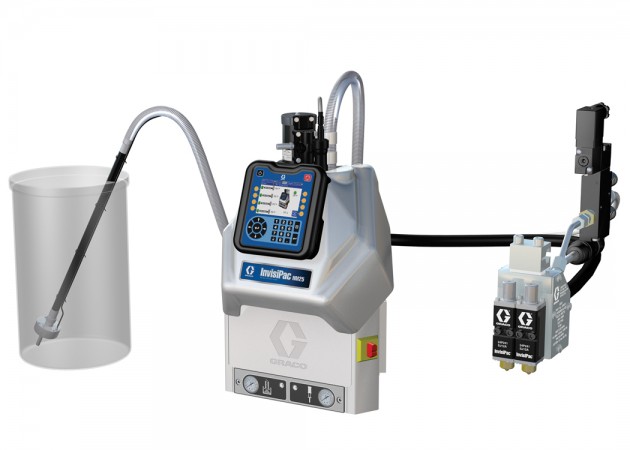
Manufactured by Graco and distributed in Canada by OBX Works, the fully-automatic InvisiPac hot-melt dispensing system is claimed to help end-users reduce their overall adhesive usage and costs by 20 to 50 per cent, depending on application.
Advertisement


